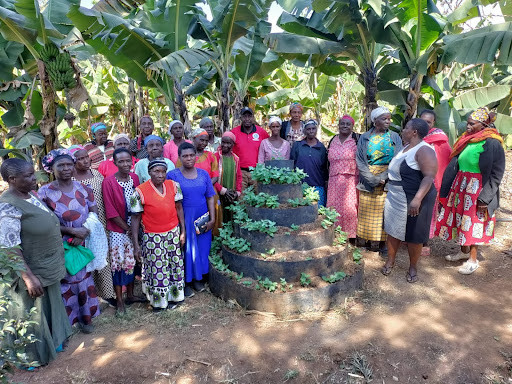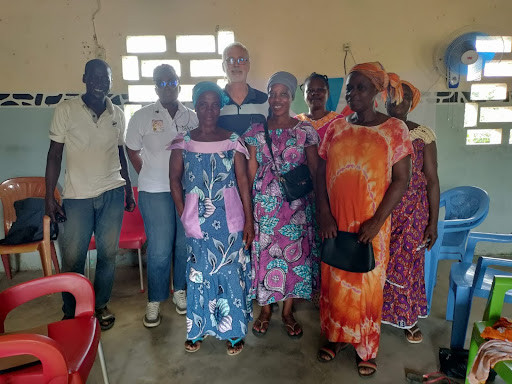NewVines International Founder on How Shifting Cultural Mindsets Can End Generational Poverty in Africa

In most parts of Sub-Saharan Africa, the roots of poverty run deep. Virgil Hughes, founder of NewVines International (NVI), has spent the last decade working with communities in Kenya, Uganda, and the Ivory Coast. His conclusion? To truly break the cycle of poverty, funding alone isn't enough. What's required is a profound shift in mindset, as well as in culture.
"It took me a while to realize it," Hughes reflects. "But what we're really seeing is culture change and mindset shift. That's what breaks generational poverty. You can't provide enough money to fix this. People need to be encouraged to do it themselves."
This faith-based nonprofit headquartered in Virginia operates on that exact premise. Through biblically grounded teachings, financial training, and deep engagement with local churches, NVI empowers individuals not just to improve their financial conditions but to fundamentally rethink their relationship with work, money, and responsibility.
The tight-knit communal cultures of rural Africa evolved from necessity. In regions threatened by natural predators and economic instability, mutual resilience became essential for survival. That has fostered beautiful traditions of sharing and interdependence. And, along with that, unintended barriers to financial independence.
"In many African communities, there's an unspoken expectation that people should unconditionally share whatever they have," Hughes explains. "While interdependence plays an important role in communal living, without boundaries, people can become dependent and mired in poverty, keeping everyone at the lowest level."
Hughes offers the example of a woman with a professional job. Her family knows exactly when she gets paid. And by the next day, her paycheck is gone, handed out to relatives. She's left with nothing, and no one is expected to explain how they used her hard-earned money. "That mindset," he explains, "is a cultural artifact of survival-based living, but it doesn't work in a modern economy driven by fiat currency. It becomes a system where no one is able to build financial security."
Another cultural challenge lies in the absence of clear property rights or personal responsibility. Hughes recounts a story of a young man who damaged a leader's property. Despite the costly repairs, there was no expectation for the man to repay any of the damages. "The cultural issue was not who caused the damage, but who's most able to actually pay for it. That kind of thinking removes personal accountability and reinforces a cycle where actions have no consequences," he states.
Rather than impose Western cultural norms, NVI takes a different approach, bringing biblical wisdom into the center of community development. "We're not exporting American values. It wouldn't make sense for us to. Instead, we're sharing biblical principles and then working with people to apply those principles in their cultural context," Hughes explains.
At the heart of NVI's approach is a spiritual reframing. For example, Proverbs 31 becomes a practical roadmap for transformation. Hughes recounts how one woman in the Adopt-a-Widow program said, "You've taken us from being Proverbs 14 women, foolish and making poor decisions, to being Proverbs 31 women: wise and full of purpose."

Christian ethics, Hughes argues, are inherently conducive to financial flourishing. Integrity, accountability, wise stewardship, and generosity are all teachings that translate into long-term stability. But, he says, these must be taught and internalized. "Biblical ethics are by their very nature development-oriented," Hughes says. "Through these teachings, individuals internalize a sense of right and wrong. And this alters the foundational relationship with money, work, and even others."
NVI's work is grounded in shifting a 'victim mindset' toward a belief in self-empowerment, particularly important in post-colonial societies where people still carry the psychological weight of historic oppression. Hughes explains, "You don't just 'get over' colonization in one generation. But what we're seeing through our training is that people are beginning to say: I can do something about my future. And that itself is a huge mental leap."
Its training is highly practical. NVI teaches people to save, budget, and make intentional financial choices. "We had men stand up and say they didn't realize gambling was wrong," Hughes shares. "They were wasting money without even thinking about it. Our teachings helped them become aware."
One of NVI's budgeting principles is "Give yourself a small reward, but only after you've set money aside for your bills and emergencies." These teachings are changing daily habits and bringing structure to lives where survival has been the only priority.
NVI's programs currently reach many churches across western Kenya and eastern Uganda. Its most notable initiative, Adopt-a-Widow, allows donors to sponsor women who have lost their husbands, often survivors of abuse or severe poverty. For $50 a month, donors help fund a kitchen garden and NVI training. After a year, participants begin small businesses, supported by 'Table Banking' and communal savings groups.
Hughes recently visited one of these groups. He says, "What I found was stunning. Women who once described themselves as 'in darkness' were now running small businesses and teaching budgeting to their grandchildren. One woman said she no longer spends a shilling on vegetables; she grows and sells her own." These groups, Hughes notes, are self-reinforcing. Once people start to experience change, they support each other. "They don't need us as much anymore. That's the goal," he adds.
With centers in Kenya, Uganda, and The Ivory Coast already thriving, NVI is expanding efforts into Togo and Tanzania. "Our goal," Hughes says, "is to create hubs of transformation where people can come, receive training, and take it back to their own communities. We're here to equip Africans to uplift Africa."
Truly, NVI is untangling the deep-rooted cultural narratives that keep people locked in poverty. "This isn't about imposing a new culture," Hughes says. "It's about revealing truths that lead to flourishing and watching people rediscover their dignity, their responsibility, and their given potential." That's the mission Virgil Hughes and NewVines International are living out one village, one training, and one mindset at a time.
© Copyright IBTimes 2024. All rights reserved.




















